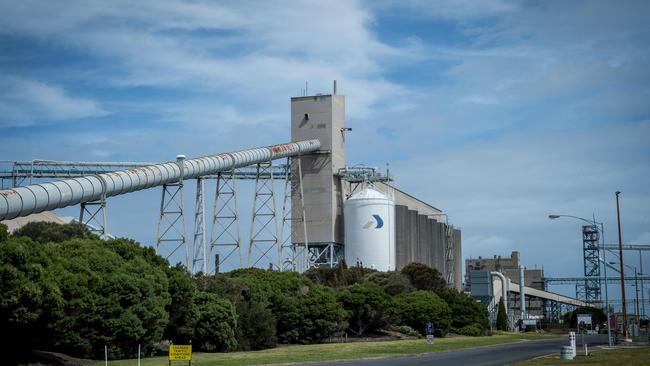Alcoa hit with fresh Australian tax claim amid Portland talks
Owner of Victoria’s Portland aluminium smelter is discussing a deal with Canberra amid uncertainty over its future.

Alcoa’s Australian operations have been hit with a claim for $128m in tax penalties, taking its total tax bill above $1bn, as its US boss revealed the owner of the Portland aluminium smelter is locked in talks with the Morrison government over a deal to “repower” the facility.
Alumina Corp, which owns 40 per cent of the Alcoa World Alumina and Chemicals partnership, revealed on Thursday the Australian Taxation Office had hit Alcoa’s Australian operations with a fresh $128m bill for penalties over disputed tax payments dating back decades.
The penalty assessment takes the total amount under dispute to $1.05bn, after Alcoa was hit in July with a $921m assessment – including $214m in back taxes and $707m in interest payments – decades-old bribery and corruption scandal in which the company allegedly used a London-based middleman to pay bribes to senior executives of Bahraini aluminium smelting giant Alba to win favourable contract terms on alumina sales from the company’s Australian operations between 1989 and 2009.
Alcoa has said it will dispute the tax bill “all the way through” the legal system.
The latest tax troubles come as Alcoa boss Roy Harvey revealed the company is locked in discussions with the federal government over a fresh rescue package for Victoria’s Portland smelter, under threat of closure when its current power deal runs out in mid-2021.
Alcoa has a live tender to Australia’s biggest electricity suppliers for the power contract but, speaking to analysts on Wednesday night, Mr Harvey said the Australian government could also play a role in its rescue.
“We are in the midst of discussions with the Australian government to repower the facility and we‘ll then be making decisions as we move forward on that,” Alcoa chief executive Roy Harvey said after delivering its third quarter earnings on Thursday.
Both Alcoa and Australian-listed Alumina — which jointly own 55 per cent of the smelter on Victoria’s southwest coast, with China’s Citic and Japan’s Marubeni owning the rest — have said a new power deal is the key to keeping Portland open ahead of the expiry of the AGL contract and rolling subsidy deals from the Victorian and federal government in 2021.
Portland’s future under Alcoa’s ownership rests on the negotiation of a new and cheaper power contract, complicated by the fact it takes most of its power from Victoria’s brown coal generators and Alcoa also wants to reduce its global carbon footprint.
Federal energy Minister Angus Taylor did not comment on status of discussions with Alcoa on Thursday, but said Portland played a “very valuable role” in stabilising the national energy grid.
“Smelters play a very valuable role in our electricity system and its ongoing reliability by providing grid services and emergency reserves, particularly over the summer period,” he said.
“The government is pursuing necessary changes to the national energy laws to enable smelters and other industry participants to be appropriately compensated for the grid services they provide. We are committed to ensuring that all businesses, including those operating in key sectors such as aluminium, have access to affordable, reliable power.”
Current Portland energy supplier AGL opened talks with the national competition regulator in May over whether it would allow a consortium of the state’s major electricity companies to collectively offer an agreed price for power to Portland at discounted rates, in order to keep the smelter operating.
However, the scheme was shelved due to onerous conditions and the unwillingness of suppliers to band together and agree a supply deal.
The deal represents one of the largest electricity contracts up for grabs in the market and such a large supply deal would normally receive strong interest. But it is understood the smelter requires an electricity contract priced at just $50 a megawatt hour — close to current wholesale spot prices — which has dampened interest among potential bidders.





To join the conversation, please log in. Don't have an account? Register
Join the conversation, you are commenting as Logout